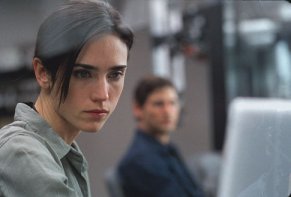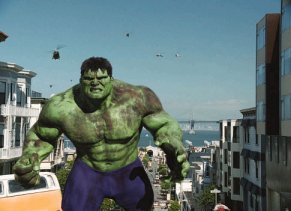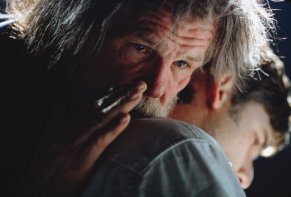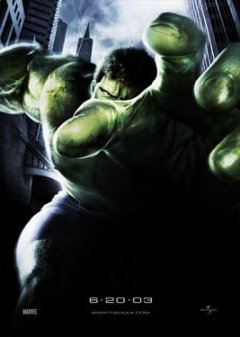|
Hulk
He's been
known by many adjectives. The Incredible Hulk. The Rampaging
Hulk. The Savage Hulk. For a brief time, you might even allow
the Soprano Hulk.
None
of these descriptives imply control. Of all the Marvel superheroes,
The Hulk is likely the one best thought of as a creature of
pure id. Putting him in the hands of a director who is all
superego makes for an odd match at best. The two sides war
throughout Ang Lee's Hulk, making for a decent film,
yet one that is too slow to get started for action fans and
too ridiculous and violent for lovers of serious film.
There's
much to be said for what Lee tries to do. Recognizing that
even non-fans have some idea of what the Hulk is about, Lee
plays up the utter emotional repression of Bruce Banner (Eric
Bana), in an attempt to make clear that there's a pent-up
rage that is all too human, a rage Banner is incapable of
letting out.
It should
humanize the character, and bring him more fully to life.
But Lee leaves Bana no choice but low-key, and though everyone
talks about how guarded Banner is, he just comes off as good-natured
and kind of boring. If anything, he comes across more passive-aggressive,
which can be dangerous. ("Don't make me disappointed; you
wouldn't like me when I'm disappointed…")
For a
guy who can't share his feelings, he sure spends a lot of
time hashing it all out with Betty Ross (Jennifer Connelly).
 In
fact, every constipated emotional nuance repeats over and
over, illustrated in as many ways as Lee can think to do.
The first five minutes of the film succinctly explain most
of Banner's dark secrets, and then get replayed as half-buried
memories and a recurring nightmare for Betty. Trying to make
the mystery as deep as possible, we even get flashbacks within
flashbacks. For at least fifty minutes, the film is as afraid
of an emotional outburst as Banner is. In
fact, every constipated emotional nuance repeats over and
over, illustrated in as many ways as Lee can think to do.
The first five minutes of the film succinctly explain most
of Banner's dark secrets, and then get replayed as half-buried
memories and a recurring nightmare for Betty. Trying to make
the mystery as deep as possible, we even get flashbacks within
flashbacks. For at least fifty minutes, the film is as afraid
of an emotional outburst as Banner is.
Even
the accident with gamma radiation (now mixed with the scientific
bugbear du jour, nanobots) plays anticlimactically.
When Banner uses himself to shield a lab assistant, the scene
freezes and cuts to him waking up in a hospital bed. None
of that messy action for us, please, we're thinking people,
not feeling ones.
Then
the imagery begins paying off. From Banner's shattered memory
comes a locked door with something violent behind it. He dimly
recalls his father, military scientist David Banner (Paul
Kersey), who did genetic research on himself and accidentally
passed the changes on to his baby boy. Before he could find
a cure, General "Thunderbolt" Ross (Todd Tesen and Sam Elliott
splitting the role) shut down the project. As a result, Banner
Senior did something awful, but we don't know what - except
that Ross had him locked up for thirty years because of it.
Behind
that door we get glimpses of what we want: The Hulk. But Banner
has no clue. Adopted by the Krenzlers (and that may be the
biggest shock to die-hard fans - he goes by Bruce Krenzler
for the first third of the film), he still unwittingly followed
in the footsteps of his natural father.
 When
the mysterious night janitor (Nick Nolte) visits him in his
hospital bed, claiming to be his father, Bruce can feel the
years of neglect building. (Except he wasn't really neglected
- his adoptive mother is shown early on, super-supportive
and loving.) Going over his notes and lab simulations one
night, it gets to be too much…and everything goes green. When
the mysterious night janitor (Nick Nolte) visits him in his
hospital bed, claiming to be his father, Bruce can feel the
years of neglect building. (Except he wasn't really neglected
- his adoptive mother is shown early on, super-supportive
and loving.) Going over his notes and lab simulations one
night, it gets to be too much…and everything goes green.
If you
can last this long, you'll be rewarded. Had the narrative
up to this point been halved, it would be more than a noble
failure. Once we get The Hulk on screen, the film comes to
life, almost tipping the balance into sheer fun, a notion
that might horrify the restrained Lee.
And yet
he keeps reminding us that it is, after all, a comic book.
The screen breaks up into panels as Lee appropriates graphic
storytelling techniques for film. It's not just split screen
- panels move and arrange themselves telling us where to look.
Figures outline while backgrounds fade away. Scenes shrink
away into a corner of blackness. And boy, is it a love it
or hate it attempt. I'm in the "love it" category, except
where it falsely builds excitement for another talky scene
about how people might feel if something were to happen.
Of course,
we're still dealing with a fifteen foot high behemoth (sometimes
less, depending on just how peeved he is). Emotional pain
accounts for some of it, but at least Lee gives us sheer catharsis
with Glenn Talbot (Josh Lucas), a far bigger jerk here than
he was in the comics. Talbot suffers no illusions about protecting
the public good; he really just wants to profit from Banner's
DNA. He figures out that maybe Banner's subconscious could
trigger the transformation, providing a loony over-the-top
underground confrontation.
For the
rest of the film, in fact, the subconscious seems to rule.
While he may be a languid pacer, Lee is also a master of imagery,
and many scenes have a dreamy quality to them that may leave
you questioning whether or not they are "real." A beautiful
trip through the clouds almost distracts you from realizing
this is the beginning of the climactic fight between Hulk
and …well, fill in the blank as to which villain it is, it's
an amalgamation of several, but at least Nolte brings life
and yes, a sense of pure and yet seductively reasonable evil,
to the role.
That
climactic fight, too, is rather short and poorly lit, so it's
hard to see what's going on. Again, it's as if to the end,
Lee is afraid to let go and give us what we want. More likely
it's being fought on some zen level, leaving it rather unsatisfying.
But Lee has already delivered, in a tremendous and extremely
bright desert battle against the military. (There - that's
one element from the comic book that really, he had
to include.)
 Most
of the character arcs that Lee and his screenwriters (John
Turman, Michael France, and James Schamus) set into motion
play through. Ostensibly Banner will learn to handle his emotions
more healthfully, but then again, if he does, there's no Hulk. Most
of the character arcs that Lee and his screenwriters (John
Turman, Michael France, and James Schamus) set into motion
play through. Ostensibly Banner will learn to handle his emotions
more healthfully, but then again, if he does, there's no Hulk.
The Hulk
himself becomes the most fascinating character, with surprising
hints at an arc. Though nobody in the film notices or comments
upon it, the more experience he gets with existence, the more
careful he seems to become of "puny humans." Is it an integration
with Banner, or the assertion of a childlike mind that wants
to do good? This question remains frustratingly unanswered.
But hey, it's a franchise, and the one area Lee compromises
is in letting that be painfully obvious. There's a lot of
room for more Hulks.
Weighed
down by its own portentiousness, the film struggles to be
a thoughtful popcorn flick. While it's an admirable effort,
it's like somebody sprinkled the popcorn with broccoli. To
get to the good part, you're going to have to grimace and
swallow a lot first.
And on
a "gee, that's kind of cool" note, Lou Ferrigno and Stan Lee
make their cameos together, early on in the film, as security
guards. It's the most dialogue Lee has had since Mallrats.
Yeah, I know this doesn't fit with the rest of the review,
but it was worth mentioning for fanboys. And Ang Lee forgot
that that's what it's about here.
What's
it worth? $6
|

 In
fact, every constipated emotional nuance repeats over and
over, illustrated in as many ways as Lee can think to do.
The first five minutes of the film succinctly explain most
of Banner's dark secrets, and then get replayed as half-buried
memories and a recurring nightmare for Betty. Trying to make
the mystery as deep as possible, we even get flashbacks within
flashbacks. For at least fifty minutes, the film is as afraid
of an emotional outburst as Banner is.
In
fact, every constipated emotional nuance repeats over and
over, illustrated in as many ways as Lee can think to do.
The first five minutes of the film succinctly explain most
of Banner's dark secrets, and then get replayed as half-buried
memories and a recurring nightmare for Betty. Trying to make
the mystery as deep as possible, we even get flashbacks within
flashbacks. For at least fifty minutes, the film is as afraid
of an emotional outburst as Banner is.
 When
the mysterious night janitor (Nick Nolte) visits him in his
hospital bed, claiming to be his father, Bruce can feel the
years of neglect building. (Except he wasn't really neglected
- his adoptive mother is shown early on, super-supportive
and loving.) Going over his notes and lab simulations one
night, it gets to be too much…and everything goes green.
When
the mysterious night janitor (Nick Nolte) visits him in his
hospital bed, claiming to be his father, Bruce can feel the
years of neglect building. (Except he wasn't really neglected
- his adoptive mother is shown early on, super-supportive
and loving.) Going over his notes and lab simulations one
night, it gets to be too much…and everything goes green.
 Most
of the character arcs that Lee and his screenwriters (John
Turman, Michael France, and James Schamus) set into motion
play through. Ostensibly Banner will learn to handle his emotions
more healthfully, but then again, if he does, there's no Hulk.
Most
of the character arcs that Lee and his screenwriters (John
Turman, Michael France, and James Schamus) set into motion
play through. Ostensibly Banner will learn to handle his emotions
more healthfully, but then again, if he does, there's no Hulk.





